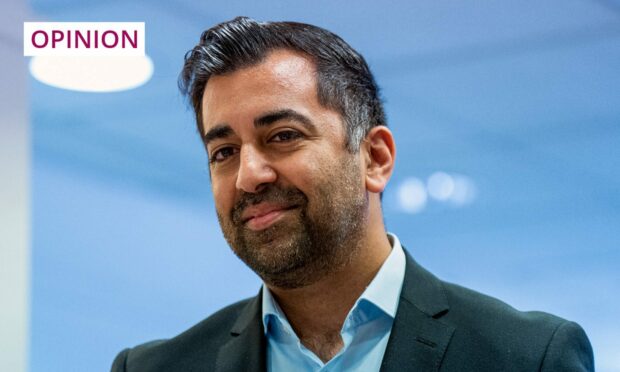Humza Yousaf is not noted for his use of fruity language, but the first minister has managed to turn the air blue on two occasions recently.
After dropping the F-bomb in an interview last week, he followed it up with an admission on the Holyrood Sources podcast that his picking of sides on key issues is going to “piss people off”.
There was a sharp intake of breath from the 100 or so people in the room for the recording – surprised, perhaps, by the industrial words being used by our normally mild-mannered leader.
I really like Humza, who is undoubtedly in it for the right reasons. However, his statement – delivered alongside a robust defence of the coalition his party has with the Greens – should come as no shock.
He has been a central figure in a government which has been perfectly happy to piss off our three world class industries – whisky, fishing, and energy – with ill-considered policy interventions.
Suggested highly protected marine areas were a mess, the mooted alcohol advertising ban fringed on the ridiculous, and the proposed presumption against oil and gas risks undermining the energy transition, which is the biggest issue currently facing our country.
Add to that the disastrous deposit return scheme and a developing crisis in Scotland’s private rented sector, and the charge sheet is damning.
North Sea industry is propping up Scotland’s balance sheet
Almost all of these mistakes have Green Party fingerprints all over them. Yet, they appear to be the one group the first minister is unwilling to cross – their votes in parliament deemed too precious to lose.
But the Greens’ addiction to superficial policies which appease a vocal minority on social media have become Humza’s Achilles’ heel, as highlighted by two recently published reports.
One – from residential property website Citylets – showed that, for a third consecutive quarter, average rents in Scotland have risen by double digits. The reason? Rent caps driving landlords away from the sector.
Government policy is throttling supply without dealing with demand – an approach all too familiar to those in the energy sector.
Any Scottish minister who thinks that shutting down the North Sea is a good idea needs to take a look at the second report I mention, the Gers (Government Expenditure and Revenue Scotland) figures released by the Scottish Government.
It showed that for every £3 raised in corporation tax in this country, £2 of it is coming from our oil and gas sector. It generated a record £9.4 billion tax take in 2022-23.
Not only is it propping up Scotland’s balance sheet, but it’s also giving us a cleaner source of the oil and gas we need right now, rather than leaving us further reliant on more carbon-intensive imports.
Humza Yousaf should be ‘pissing off’ his coalition partners for once
The north-east’s world class offshore industry should have the full backing of the Scottish Government. Instead, it has a confidence-sapping presumption against future development to contend with.
Just like rent caps, this has unintended consequences which the Greens are blind to, and will likely lead to higher emissions if we come to rely more heavily on imported gas from the likes of Qatar.
However, next month, the first minister has the chance to clear the decks, and as the Offshore Europe conference gets underway in Aberdeen, he will be in Edinburgh outlining his programme for government.
It is a chance for him to reset and plot a different course, one which has improving our economy as its central mission.
The presumption against oil and gas must go, and be replaced with a policy position which will deliver energy security and transition in tandem.
If the alternative is importing oil and gas at a greater carbon cost, then we must favour domestic production. It’s simple, it’s pragmatic and it commits us to sourcing the fossil fuels we need in a manner which minimises emissions and secures tens of thousands of Scottish jobs.
This might mean, as Humza Yousaf puts it, pissing some people off. For once, those people need to be his coalition partners.
If he keeps picking the wrong side, he’s going to find an increasing number of Scottish businesses, and the Scottish electorate, on the other. He can afford to lose neither.
Ryan Crighton is policy director at Aberdeen & Grampian Chamber of Commerce


